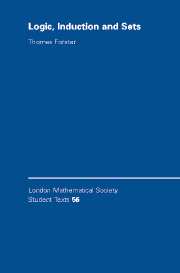5 - Predicate calculus
Published online by Cambridge University Press: 05 June 2012
Summary
The birth of model theory
An important spur to the development of logic was the problem of the axiom of parallels and the discovery of noneuclidean geometry. If we are trying to determine whether or not the axiom of parallels follows from Euclid's other axioms, what do we do? If it does, life is easy, for it will be sufficient to exhibit a proof. If it does not, we need to demonstrate that there is no proof.
One way to do that would be to develop a formal device of proof-as-mathematical- object and then show that every proof fails to be a proof of the parallel axiom from the other axioms. Although we have made a start on proofs-as-mathematical-objects, we have not yet come up with anything that has been much good for constructing independence results.
Another possible approach would be to exhibit a model universe in which the parallel axiom is false but all the other axioms of Euclid are true. This requires us analogously to have a formal device of modelas- mathematical-object. For this we have to develop a robust concept of a formula being true in a structure. That is to say, we need semantics. We have already heard the phrase: the autonomy of syntax. Independence proofs of this second kind become possible only once one has started thinking of a syntax as something entirely separate from the subject matter it was devised to denote.
- Type
- Chapter
- Information
- Logic, Induction and Sets , pp. 94 - 122Publisher: Cambridge University PressPrint publication year: 2003



